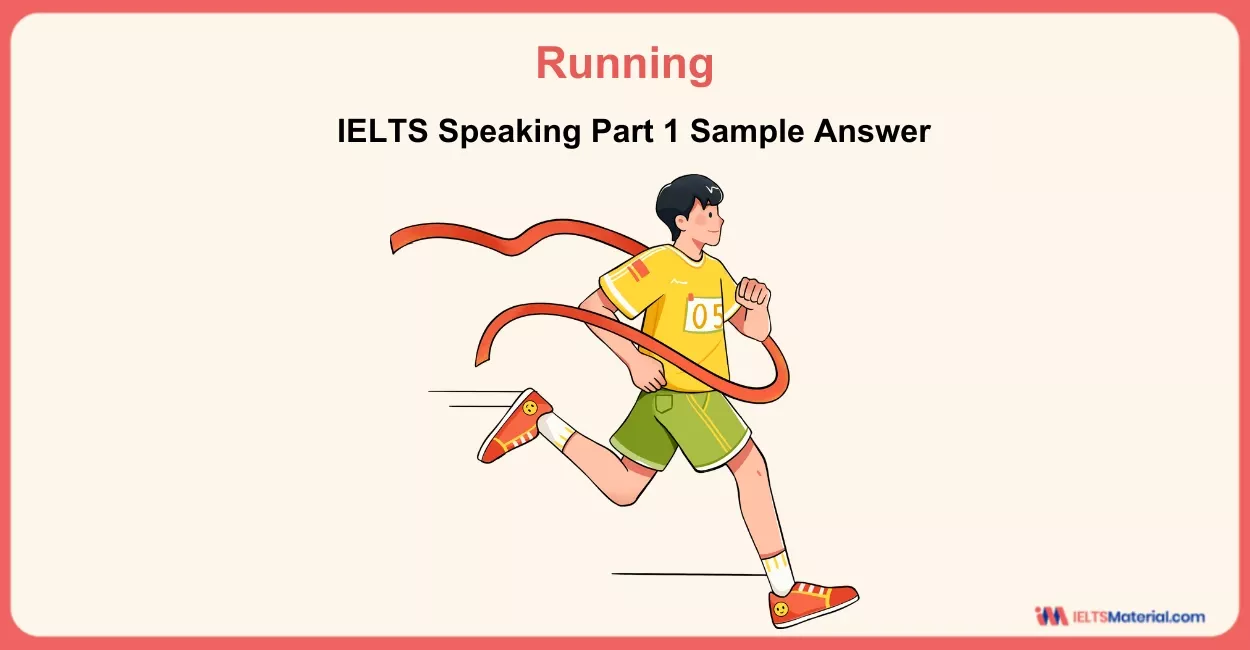Walking - IELTS Speaking Part 1 Sample Answer
Want to practice strategies to tackle the IELTS Speaking Part 1? Build fluency, use appropriate vocabulary words, and learn band 8+ tricks on how to answer on the topic ‘Walking’ and analyze the sample answers to express ideas with ease and accuracy.
Table of Contents

Limited-Time Offer : Access a FREE 10-Day IELTS Study Plan!
With the topic on ‘Walking’, you will be assessed based on your ability to communicate fluently and confidently in everyday situations. Since the IELTS Speaking module consists of three parts, you need to be well aware of the way you need to approach the questions in part 1. This section lasts for 4-5 minutes which is the time for the examiner to get to know you better.
Even though this part seems easy, you need to incorporate a few strategies to become familiar with it. Mastering this section will give you the confidence to attempt part 2 & 3 questions easily since it sets a strong foundation. As you utilize a few band 8+ tips in your IELTS preparation, you are just a step away from getting the desired band score.
Connect with our IELTS Experts to crack your IELTS Speaking and ace the exam with a band 8+! Book a Free Demo.
How to Answer IELTS Speaking Part 1 Questions on ‘Walking’?
The IELTS Speaking Part 1 is an opportunity to showcase your ability to extend your answers while showcasing a range of vocabulary and grammar. However, it is necessary to utilize a few strategies as you prepare yourself for this section since it will help understand how to frame your answers. Below are some of the tricks which you can use to practice on various topics like ‘Walking’.
- Even though the questions are quite simple, try not to provide one word answer. Instead, you can focus on creating sentences with a bit of elaboration on the answer.
- Try not to memorize any answer because you might sound very robotic. Therefore, you need to vary your voices for which work on your voice modulation and intonation.
- Using the appropriate vocabulary words would add depth to your answer while making your sound natural. Since there are different topics, get familiar with the Latest IELTS Speaking Vocabulary to Boost Your Score and you would get to use them appropriately.
- Always record yourself speaking so that you can listen back to the recording and spot the areas where you need to improve. This could be in terms of hesitation or problems in fluency.
- Remember to paraphrase the question and elaborate on your answers. But remember to stay on topic and refrain from moving away from it or explain too much.
- Incorporate the Useful Idioms for IELTS Speaking to Score Band 8.0+ since these idiomatic expressions would add richness to your answer. However, do not repeat them multiple times as it could become redundant.
- In this section, you need to provide personal information and talk about your experiences. Make sure that your responses are engaging and natural.
- Try not to self-correct as you provide answers to the questions unless it is absolutely necessary. Incorporate filler words so that the fluency is not affected.
- With the main topics from IELTS Grammar, you will learn how to create sentence structures which will elevate your band scores in terms of grammatical range and accuracy.
Want to learn how to score a band 9 in the IELTS Speaking Section? Check out the video below!
IELTS Speaking Part 1 Questions on Walking
In order to achieve a higher IELTS Band Score, remember to attempt answering the questions yourself first before you move on to the sample answers. With these question types, you will enhance your speaking skills while making you feel confident. Since this is the first part, practising to answer would help you stay calm during the actual exam. Let’s check out the IELTS Speaking Part 1 questions on ‘Walking’.
- Do you like walking?
Walking is unavoidable, especially when you live on campus. You go to school on foot, you go to buy food on foot, you walk here and there everyday. There are days that my legs actually killed me. Therefore, I have to say that walking is not my cup of tea, although I have to walk on a daily basis.
- Do you like to walk on your own or with others?
Say if I’m in a hurry, I just walk or run as fast as I can, no time for chit-chat right? But even when there's plenty of time, walking is ideal to calm down, breathe in some fresh air and enjoy the world outside in silence. Every once in a while I take a long walk after school. So I think I’m more into walking on my own.
- Would you say that your city is a good place for walking?
Walking is not as popular as it used to be in my city, as more and more people prefer riding a motorbike. So currently there are fewer parks and walking areas for residents. Moreover, walking under such hot weather and heavily polluted air is definitely not a good idea. So I would not recommend my city as a good place for walking.
- Do people in your country walk a lot?
Nowadays they don’t walk as much as they used to in the past. Private transportation is becoming more affordable and diverse in terms of price, design and quality. You may easily catch signs of the middle-aged and the elderly walking in the park or on the street, and they all look like they are enjoying themselves.
- Do you think walking is important?
Absolutely. Walking is the most convenient and simple exercise. Not only do people of all ages & all walks of life do it, but it also encourages us to get outdoors to change a bit of our surroundings, thereby helping us relax and stay balanced.
- Do you walk more than in the past?
I definitely do. When I stayed at home, I took the bus to school, and all my chores were done for me. Now I live on campus. I have to walk from my dorm room to class and back. I have to walk around campus to buy stuff, and get things done. So I definitely walk a lot more than before.
- Do you think walking in the countryside is better than walking in the city?
I obviously think it is much better to go for a stroll in the countryside than in the city because the air in the countryside is fresher and healthier to breathe, unlike that in big cities, which contain toxic chemicals. Also, there is less traffic in the country so it is less likely for one to get hit by a car while walking, which happens pretty often in cities, unfortunately.
- What could be done to improve the experience of walking in cities?
Well, this is an interesting question to think about. I certainly think people in big cities should be encouraged to walk more. In order for this to be done, they need to ensure that walking in the city is healthy and safe. Bigger and better sidewalks with walking times and directions to various destinations should be considered by the relevant authorities.
Grab the Comprehensive IELTS Speaking Band 8 Preparation Course to access the sample band 9 answer scripts and band 9 vocabulary related to specific topics!
Vocabulary for IELTS Speaking Part 1 on ‘Walking’
- Worth preserving: to keep safe from injury , harm or destruction, protect.
- On campus (n): the grounds and buildings of a university or college
- Here and there (idiom): in various places
- Not one’s cup of tea (idiom): not what one likes or is interested in
- In a hurry (idiom): going somewhere very quickly, usually because you are late
- Chit-chat (noun): informal conversation about unimportant matters
- To calm down (n): to feel more relaxed
- Once in a while (idiom): sometimes
- To be into something (idiom): to be interested in something
- Resident (noun): a person who lives in a place permanently
- Diverse (adj): of various kinds or forms
- Middle-aged (adj): being in the time in a person’s life between youth and old age
- Walk of life (phrase): An occupation, profession, or social class
- Go for a stroll (phrase): walk slowly in a relaxed way
- Toxic chemical (collocation): any chemical can cause death, temporary incapacitation, or permanent harm to humans or animals
Enroll into our Free IELTS Webinar and learn more about techniques to improve your speaking skills to achieve a band 8+.
While preparing for the IELTS Exam, you need to practice on a regular basis so that you are familiar with the specific structure to be used for the speaking part 1 questions. Note that just speaking might not help you but by using a few strategies, you can learn how to approach such questions. Practising on different topics would give you the opportunity to hone your speaking skills and achieve a band 8+ in this section.
Related Cue Cards:
Also Check:

Start Preparing for IELTS: Get Your 10-Day Study Plan Today!
Explore other Speaking Part 1 Topics

Kasturika Samanta

Prity Mallick

Nehasri Ravishenbagam

Kasturika Samanta
Recent Articles

Nehasri Ravishenbagam

Nehasri Ravishenbagam

Kasturika Samanta

Kasturika Samanta




Post your Comments